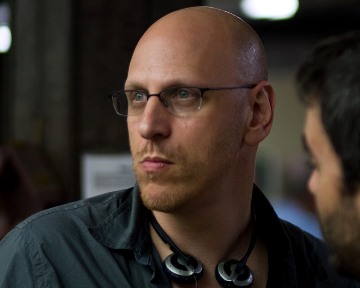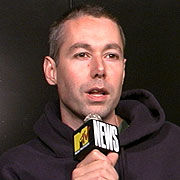The Only Successful Model for Indie-Film: Fiscal Caution and Artistic Risk- Interview with Oscar Nominated Director Oren Moverman - Levi Shapiro - MediaBizBloggers

Hollywood threw itself a party last evening. Unfortunately, in the business of specialty film there is little to celebrate- 2009 was a year of record losses. A glut of more than 420 specialty films were dumped on the market last year but less than 10% were profitable. Production costs for with stars attached averaged $8 million (before marketing) but earned only $1.7 million. In this environment, specialty units at Warner, Paramount and Disney have been shuttered or severely curtailed. This has opened the door for newer, more nimble entrants, like Beastie Boy (aka Nathaniel Hornblower, aka MCA), Adam Yauch (pictured right). His two year old indie distributor Oscilloscope Labs acquires films on the festival circuit while maintaining low overhead. The process generated two Academy Award nominations for "The Messenger" from first-time, Israeli-born director Oren Moverman. The commercial and critical success of "The Messenger" suggests a path to profitability for other film-makers:
celebrate- 2009 was a year of record losses. A glut of more than 420 specialty films were dumped on the market last year but less than 10% were profitable. Production costs for with stars attached averaged $8 million (before marketing) but earned only $1.7 million. In this environment, specialty units at Warner, Paramount and Disney have been shuttered or severely curtailed. This has opened the door for newer, more nimble entrants, like Beastie Boy (aka Nathaniel Hornblower, aka MCA), Adam Yauch (pictured right). His two year old indie distributor Oscilloscope Labs acquires films on the festival circuit while maintaining low overhead. The process generated two Academy Award nominations for "The Messenger" from first-time, Israeli-born director Oren Moverman. The commercial and critical success of "The Messenger" suggests a path to profitability for other film-makers:
- low overhead
- story integrity
- built-in audiences
- artistic risks
The indie-film model of this decade is based on Miramax of the nineties. Harvey Weinstein's formula included nurturing talented young film-makers (Quentin Tarantino, Gus van Sant, etc), picking stories with built-in audiences and aggressively promotion to the Academy of Motion Picture Arts & Sciences. This yielded mega-hits like Pulp Fiction and Chicago ($213 million and $306 million) plus Oscar sweeps such as The English Patient (nine) and Shakespeare in Love (seven).
In the new indie-film economics, writer / director Oren Moverman incorporates a different formula for The Messenger. The film is about two members of the Contact Notification Office in the US Army. Their job is to inform the next of kin about the death of a loved one.
1. Maintain the Integrity of the Story: Sometimes "development hell" helps clarify artistic vision. The script, co-written by Moverman and Alessandro Camo, was attached to three directors in three years- Sydney Pollack, Roger Michell and Ben Affleck. Pollack wanted a love story while Affleck emphasized combat scenes. Oren held firm in the story he required. "To us, it's about grief and life, about needing to move back into the realm of the living once faced with death. And so it's a much more universal theme than just a particular war. All of us will get notified one day."
Directing the film allowed Moverman and Camo to work the material from the inside, adhering to the integrity of the story. "That is a gift".
2. Nurture a built-in audience: "The film was supported by the army from the beginning. We asked for their help and advice, they read the script and said, 'Yes, we want you to make this movie and we will help.' So they gave us access to a base to shoot, and we had a full-time adviser on the set. So we knew that officially the army as an institution was behind the movie."
In the United States, there are two million men and women in uniform and millions more veterans and their families. Oscilloscope reached out to this potential audience quite early, arranging screenings for military families in the DC area. This encouraged a built-in audience and word of mouth, creating interest in the film before its release. "Soldiers individually responded to the movie, which I think was a really important thing for us, and a real honor. In particular, soldiers of the Vietnam generation." That word of mouth was very cost-effective.
The film also generated buzz through the festival circuit. It was acquired at Sundance 2009 and won two awards at the Berlin Film Festival- Best Screenplay and Peace Award. This notoriety meant a strong opening last November when it premiered on just four screens. The critical support, end of year release prior to awards season and targeted screenings combined to help The Messenger realize $1 million in box office.
3. Artistic Risk: The most important ingredient for indie success, other than fiscal caution, is artistic risk. Oren embraced creative risk. "For the notification scenes, I didn't let the two sides meet before the scene and there were no rehearsals. We wanted everything fresh and raw. This script is so raw, it might as well be raw on film. We also encouraged the cast to explore their characters. Some of our best moments were not in the script.
We didn't want to show anything but human situations. We used only zoom lenses to allow a slow, subtle approach to and from the characters. There is one insert in the movie, otherwise every frame has some human interaction. There are no establishing shots, no dissolves, nothing fancy, just a camera longing to lock in the essence of the emotions portrayed on screen."
Oren's likely next project will be a big studio release with a built-in audience, the Kurt Cobain biopic. Oscilloscope is following that path of other indie distributors that have showed staying power, such as Zeitgeist and Kino- keep costs low and quality high. At the Academy Award announcement, Adam Yauch had a message: "Watch out Harvey, it's on now".
Levi Shapiro is a Partner at TMT Strategic Advisors, a research and strategy firm focusing on the technology, media and telecom sectors. He can be reached at levi.shapiro@tmtstrat.com or via twitter: @levshapiro
Read all Levi's MediaBizBloggers commentaries at Unleavened Media - MediaBizBloggers.
For more Oscar commentary read: "Avatar" Ignored at the End of Yet Another Tiresome Academy Awards CeremonyBy Ed Martin - MediaBizBloggers


